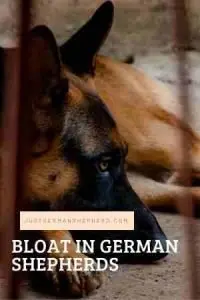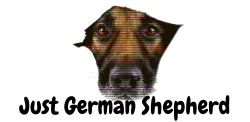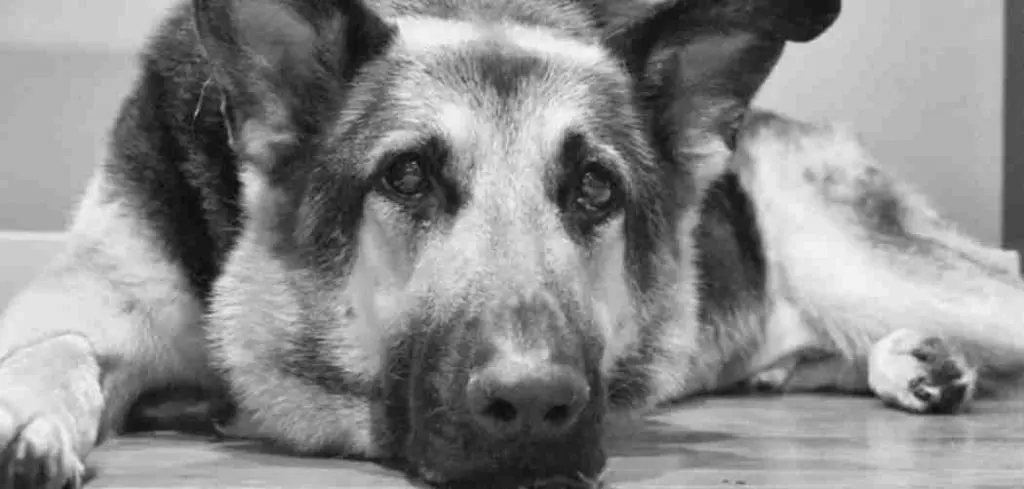
We hope you never have to experience bloat (or GDV) in your German Shepherd but understanding what it is, what causes it and how it’s treated can give your GSD a better chance of survival. It is also key for us to point out that GDV is an incredibly rare condition.
Table of Contents
What is bloat?
Bloat is a serious, life-threatening condition, particularly in larger dogs. German Shepherds with their deep chests are particularly susceptible to bloat.
Bloat is often caused by the swallowing of air, however food and liquid can contribute (See our article on Elevated Bowls for more info). When bloat happens, the stomach fills with gas and often twists cutting off the blood supply to the gut, this then stops gas and food from leaving the stomach. As the gases in the stomach increase, this can stop the blood from returning to the heart sending a dog into shock.
If the stomach twists this will drag the pancreas along with it which cuts off the blood supply to the organ. Without oxygen, the pancreas produces incredibly toxic hormones that can target the heart and stop it from beating. It is not uncommon for a German Shepherd to go through successful veterinary treatment for bloat and seem out of danger only for the heart to suddenly stop.
Symptoms of Bloat
Symptoms usually appear quickly in a German Shepherd with bloat, bloat will typically present some, but not all of the below symptoms. The key Symptoms include:
- Attempting to vomit/Retching
This is one of, if not the most common symptom of bloat. If your German Shepherd is trying to vomit without anything coming out, you may see small amounts of water or, more often, large volumes of thick, stringy saliva, this is considered an urgent symptom and you should seek help immediately.
- Swollen, hard stomach
This isn’t always obvious, particularly in a larger German Shepherd. However if you do feel your GSD’s stomach and it feels large and swollen this is often a key symptom of bloat.
- Excessive drool/saliva
The amount of saliva from dogs with bloat is normally large and can occasionally be accompanied by ‘lip smacking’. Both are signs of a nausea that German Shepherds usually experience with bloat.
- Fast/Heavy or Difficult Breathing/Panting
Caused due to both the reduced space in the GSD’s stomach and also the acid and other metabolic anomalies that are occurring due to the bloat. Can also be caused due to the extreme pain the dog will be in.
- Hunched Up or Spread Out Appearance.
This is the German Shepherd trying to improve their breathing. The GSD will be doing this in an attempt to free it’s lungs and help them expand enough to take in the air.
Other symptoms include:
- Pale or off-color gums. Dark red in early stages, white or blue in later stages.
- Lack of normal gurgling and digestive sounds in the tummy. Many dog owners report this after putting their ear to their dog’s tummy.
- Coughing
- Foamy mucous around the lips, or vomiting foamy mucous
- Unproductive attempts to defecate
- Whining
- Pacing
- Licking the air
- Seeking a hiding place
- Looking at their side or other evidence of abdominal pain or discomfort
- May refuse to lie down or even sit down
- May attempt to eat small stones and twigs
- Drinking excessively
- Heavy or rapid panting
- Shallow breathing
- Cold mouth membranes
- Apparent weakness; unable to stand or has a spread-legged stance. Especially in advanced stage.
- Accelerated heartbeat. Heart rate increases as bloating progresses.
- Weak pulse
How Can I prevent bloat in my German Shepherd?
The exact causes of bloat are not really 100% understood however factors such as family history, stress, and speed of eating can all be contributing factors. There is research that feeding little and often can assist with reducing bloat. It is also advised to wait around 1hr after feeding your German Shepherd before exercise.
If your GSD is a real gulper it is recommended to use a slow feeding bowl such as this one from Amazon. In a study completed by Purdue University it was also discovered that raised or elevated food bowls were also a contributing factor to Bloat, in fact they can increase the chances of bloat by more than 100%.
How will the vet treat Bloat?
Unfortunately, the symptoms of Bloat are common across other potential emergencies therefore unless it is obvious your vet will likely complete a scan first. When it is confirmed as bloat your vet will firstly release the build up of gas and air inside the GSD’s stomach to stop the stomach tissues from dying and to ease the load on the surrounding organs. Initially this will be done using stomach pump however sometimes surgery is needed. At this point it is usually still possible to untwist the gut.
While your vet is conducting this work you dog will usually be being treated with IV fluids in an attempt to reduce the heart rate and reverse the shock. The IV’s will usually consist of painkillers, antibiotics and medicines that help to correct the blood flow.
If the German Shepherd is luck enough to survive this initial ordeal, then it will need to have additional surgery to repair the damage to the stomach.
GSDs that suffer from bloat are unfortunately incredibly likely to have further attacks and as a result your vet will often attach the dog’s stomach to it’s body wall to stop it from twisting again
If we’ve missed anything out of this article or you have any questions we’d love to hear from you in the comments section below. Alternatively, feel free to reach out to us using the Contact Form on the Home Page

